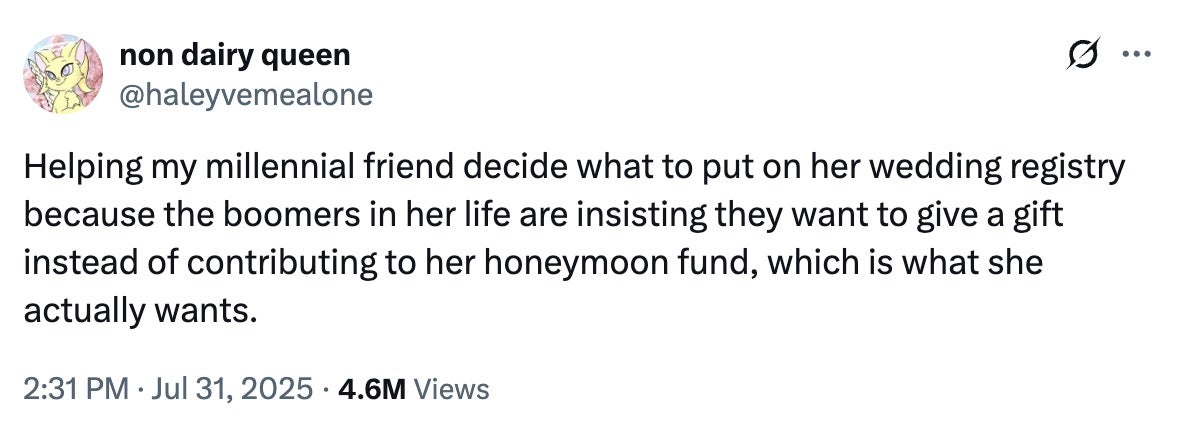The conversation surrounding wedding gift registries versus honeymoon funds has ignited a spirited debate online, highlighting generational differences in attitudes toward gift-giving. This discourse gained traction in late July 2023 when a tweet from user @haleyvemealone brought attention to the clash between millennial preferences and traditional boomer expectations. The tweet read, “Helping my millennial friend decide what to put on her wedding registry because the boomers in her life are insisting they want to give a gift instead of contributing to her honeymoon fund, which is what she actually wants.”
More couples are now opting for honeymoon funds instead of traditional gift registries, a trend that reflects changing lifestyles and priorities. Many millennials, now in their 30s and 40s, have already established their homes and acquired household items over the years. As a result, they often find themselves with everything they need, leading to a preference for experiences over material goods. For these couples, asking for contributions toward a honeymoon is not only a practical choice but also a more meaningful way to celebrate their marriage.
The notion of honeymoon funds is often met with skepticism, particularly from older generations. For many boomers, the tradition of asking for specific gifts is deeply ingrained, and the idea of requesting money for experiences seems less personal. Some argue that asking for monetary contributions can appear crass or impolite. This sentiment was echoed in various online comments, where users expressed their discomfort with the practice.
The debate showcases a wider cultural divide. While some believe that asking for money undermines the spirit of gift-giving, others argue that it is unreasonable to expect couples who already have established households to seek out material gifts. One commenter noted, “If you have all the nicer linens and beautiful china, then say no gifts.” This perspective indicates a growing acceptance of alternative approaches to wedding gifts, especially for those who have already merged their lives and possessions.
As conversations unfolded on social media, some users voiced their support for honeymoon funds, explaining that they would prefer to give cash for experiences rather than household items the couple may not need. One participant stated, “I’d rather get money for experiences or our savings than household items we already own.” This highlights a shift in priorities, with many couples valuing shared experiences over tangible gifts.
Despite the pushback from some traditionalists, the idea of requesting honeymoon funds resonates with many couples today. With the rising costs associated with weddings and honeymoons, this approach may also be a practical solution for those looking to balance their budgets.
As this debate continues, it underscores a more significant shift in societal norms regarding weddings and gift-giving. Couples are increasingly inclined to express their desires transparently, which challenges the conventional expectations imposed by previous generations. This evolving discourse reflects how weddings are not merely celebrations of union but also personal expressions of values and preferences.
Ultimately, the question of whether asking for honeymoon funds is tacky or tasteful may depend on individual perspectives. As societal attitudes shift, the lines between tradition and modernity blur, leaving room for diverse interpretations of what it means to celebrate love and commitment.








































































